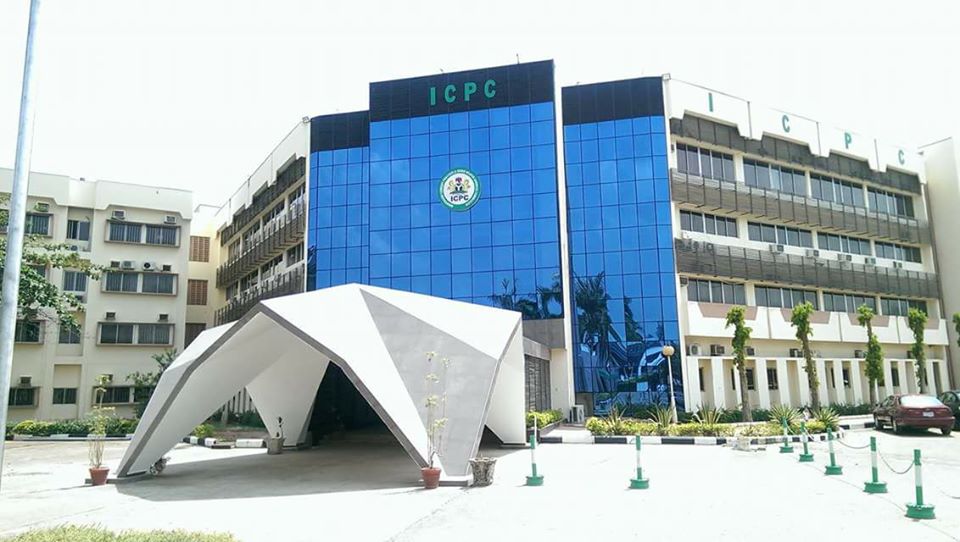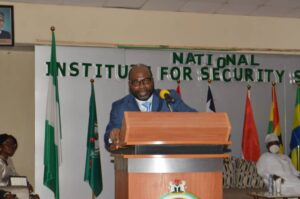Integrity Awards to Inspire Hard work and Integrity – ICPC Boss

Chairman of the Independent Corrupt Practices and Other Related Offences Commission (ICPC), Professor Bolaji Owasanoye, SAN, has said that the Public Service Integrity Award organized by the Commission was aimed at encouraging hard work and integrity in the public service.
Professor Owasanoye said this through the Commission’s Spokesperson, Mrs. Azuka Ogugua, during an interview session with the Nigeria Assembly News at the Commission’s headquarters recently.
The ICPC Chairman noted that two serving public servants at the federal level who had shown exceptional acts of integrity in the course of their official duty were identified, honoured and given cash rewards of N2.5m each.
In his response to the rate of compliance of ICPC to the Freedom of Information (FOI) Act 2011, he affirmed that the Commission is one hundred per cent compliant. He further explained that in the bid to make information readily available to the public, the Commission has a dedicated segment on FOI on its website, www.icpc.gov.ng.
The Chairman also said that ICPC proactively discloses information by displaying its annual reports and procurement information on the website. He added that the FOI request form on the website is easy to access while noting that ICPC replies all requests to the Commission.
“Staff have been trained on the FOI Act. The desk officers’ contact details are also displayed on the Commission’s website”, he said.
In his comments on how the tripartite mandate of enforcement, prevention, education and mobilization duties had fared from inception, the ICPC recounted the achievements of the Commission, noting that ICPC has recorded many convictions, recovered and seized assets worth billions of naira.
Still, on achievements, the Chairman revealed that the Commission has successfully tracked 564 Constituency and 269 Executive projects. He noted that while 445 ACTUs have been established across the MDAs in the country, 47 SSR have been conducted in some MDAs and directives issued for them to correct areas prone to corruption.
He also said that the Commission has “conducted Corruption Risk Assessments in Ports, Aviation, Ministry of Water Resources, Education and Health, and E-Government platforms of government”.
“We have affected port agencies positively resulting in the development of a grievance management mechanism called Ports Service Support Portal (PSSP), and the Nigerian Ports Process Manual” he added.
Other initiatives by the Commission aimed at diminishing corruption according to the ICPC Chairman include the National Values Curriculum (NVC), National Ethics and Integrity Policy (NEIP), National Anti-Corruption Coalition (NACC) for Civil Society Organizations (CSOs), Students Anti-Corruption Clubs (SAC) for secondary schools, and Students Anti-Corruption Vanguard (SAV) for tertiary institutions.
Speaking about how the 2003 revocation of the Corrupt Practices and Other Related Offences Act, 2000 (CPOROA), by the 6th National Assembly affected the gains of the Commission, the ICPC Chairman categorically stated that the revocation did not stand therefore, it did not have any effect to the growth or gains of the Commission.

Prof. Ojerinde, ex- JAMB Registrar arraigned, remanded in Prison over N5 billion fraud
The former Registrar of the Joint Admissions and Matriculation Board, (JAMB), Professor Lawrence Adedibu Ojerinde has been arraigned by the Independent Corrupt Practices and Other Related Offences Commission (ICPC) on an 18-count charge bordering on abuse of office and fraud to the tune of N5 billion.
Ojerinde was arraigned before Hon. Justice Obiora Egwuatu of Court 9, Federal High Court, Abuja for alleged offences committed while he was in office as Registrar/Chief Executive of National Examinations Council (NECO) and also as Registrar of JAMB.
Facts contained in the proof of evidence signed by Ebenezer Shogunle, show that the accused had conferred corrupt advantages upon himself at different times while being Head of JAMB and NECO, thereby violating Sections 19, 24, 25 (1) (a) and (b) of the Corrupt Practices and Other Related Offences Act 2000 and Section 1 (1)(b) of the Advance Fee Fraud Act, 2006.
Part of the charge reads, “That you, Professor Lawrence Adedibu Ojerinde, on or about 11th March 2003 in Minna while being a public officer charged with the administration and management of a Federal Government Agency, used your position as Registrar/Chief Executive of the National Examinations Council (NECO) to gratify yourself by corruptly converting the sum of N27million property of the Federal Government of Nigeria known as TEJUMOLA HOUSE, Ikeja, Lagos in the name of DOYIN OGBOYI INDUSTRIES LTD, a company in which you have a private interest and you thereby committed an offence contrary to and punishable under section 19 of the Corrupt Practices and Other Related Offences Act, 2000”
Another count reads, “That you Professor Lawrence Adedibu Ojerinde, on or about 16th February 2009, in Abuja used your position as Registrar of the Joint Admissions and Matriculation Board (JAMB) to confer a corrupt advantage upon one Jimoh Olabisi Olatunde, a public officer, by instructing Zenith Bank Plc to open an account No. 1002833087 in the name of JAMB/J.O. Olabisi into which you subsequently diverted a cumulative sum of N2,769,083,044.04 (Two Billion, Seven Hundred and Sixty-Nine Million, Eighty-Three Thousand, Four Hundred and Forty-Six Naira, Four Kobo) property of the Federal Government of Nigeria, and you thereby committed an offence contrary to and punishable under section 19 of the Corrupt Practices and Other Related Offences Act, 2000.
The accused person pleaded not guilty when the charges were read to him. Defence Counsel, P. A. Olorunnisola, SAN asked the court for bail for his client on medical grounds.
However, ICPC prosecution team had filed a counter-affidavit showing that the application did not carry any medical proof and that ill-health was not enough grounds for granting bail.
In his response, Olorunnisola prayed the court for an adjournment to enable them to respond to the affidavit by the prosecution.
In his ruling, Justice Egwuatu said the bail application will be heard on Thursday, 8th July 2021 while the accused person, Ojerinde be remanded in Suleja Prison.

We Need Strong Institutions To Fight Corruption, IFFs – ICPC Boss
Nigeria requires strong institutions and systems to fight corruption and Illicit Financial Flows (IFFs), the Chairman of the Independent Corrupt Practices and Other Related Offences Commission (ICPC), Prof. Bolaji Owasanoye, SAN, has recommended.
He made this recommendation while delivering a lecture to participants of Executive Intelligence Management Course 14 of the National Institute for Security Studies in Bwari, Federal Capital Territory (FCT).
In his paper titled “Governance, Corruption, Rule of Law and Security in Africa”, Prof. Owasanoye stated that the solution to corruption, economic and security problems bedeviling Nigeria lies in building strong institutions and systems with active collaboration from state and non-state actors.
He said, “Corruption and weak governance are mutually reinforced. Corruption and weak governance impact development, peace and security in multiple ways.
“Diversion of public budget in the expenditure side of revenue, direct looting of treasury, illicit financial flows (IFFs), tax evasion, misapplication of funds, deliberate elephant projects, and contract and procurement abuse have huge implication for development.
“Without development, there can be no peace or security and without peace and security, development is a mirage. Massive investment in infrastructure is the route to development”
In a related development, the ICPC Chairman has called on Sub-Saharan African Countries to reverse illicit financial flows and prioritize asset recoveries towards minimising the menace of corruption in the region.
Prof. Owasanoye, who gave the charge at the virtual conference for Heads of Anti-Corruption Agencies in Africa, called for the utilisation of proceeds from recovered assets to tackle the problem of poverty in the sub-region.
Delivering a paper titled “Understanding the Common African Position on Asset Recovery (CAPAR)”, the ICPC boss said Africa could not eradicate poverty or meet Sustainable Development Goal (SDG) without prioritising asset recovery and domestic resource mobilization.
“The sure way to diminish corruption is to improve domestic resource mobilisation in the region and also to reverse illicit financial flows. It would be a dream to assume that we would achieve it without meeting the basic results that have been set for basic mobilization.”
He further stated that the world has lost huge revenues to corruption and illicit financial flows, adding that the country had recovered up to $700 million of assets in the last six years.
He highlighted the CAPAR framework to include Detection and identification of Assets, Recovery and Return of Assets, Management of Recovered Assets, Recommended Actions on Asset Management and Cooperation and Partnerships.
Owasanoye called on heads of member states to adopt a policy on the use of asset recovery and management for development goals.





